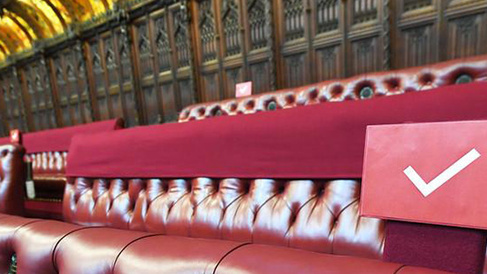
Professor Lord Robert Mair, Head of CSIC, contributed to a House of Lords debate taking note of the case for post Covid-19 recovery strategies that will contribute to a fairer, cleaner, and more sustainable economy, held on Thursday 11 June.
Opening the debate, Baroness Lady Hayman said: “This crisis offers us a once-in-a-lifetime opportunity to rebuild our economy in order to withstand the next shock coming our way – climate breakdown. Unless we act now the climate crisis will be tomorrow’s central scenario, and unlike Covid-19 no-one will be able to self-isolate from it.” Baroness Hayman was referencing the former Governor of the Bank of England, Mark Carney, his successor Andrew Bailey, and other European bankers who argued in the same week for a recovery that places our net zero objectives at its heart.
Citing the many global businesses stating support for a green recovery plan – with efforts aligned with the UK’s legislated target of net zero emissions by 2050 to accelerate the transition to net zero Baroness Hayman called for an economic recovery that is fair to all. The global nature of the crisis was noted and Baroness Hayman concluded her opening speech expressing the need “to secure international support and co-operation for a global road map to net zero and the philosophy of building back better”.
With contributions made both from the House of Lords, where social distancing measures are currently in place, and remotely, the debate attracted many contributors who were each limited to speeches of two minutes. Professor Lord Mair, speaking as a civil engineer, made three points relating to carbon, resilience of our infrastructure, and prioritisation of resources. He said: “The Government has legislated to cut greenhouse gas emissions to net zero by 2050. We have a long way to go in achieving this and must act quickly. We require smart engineering to minimise the use of materials and energy, while still ensuring resilience of our infrastructure. This can be achieved by many innovations, including the latest digital and sensing technologies.”
Bringing attention to the role of innovation and clean energy, Lord Mair said: “We must be innovative with green stimulus programmes. We should be planning modern transport infrastructure, reducing car use and pedestrianising cities. We should construct more renewable energy sources, such as offshore wind. Carbon capture and storage should be exploited for low-carbon production of cement and hydrogen fuels. All such initiatives will involve welcome new employment opportunities, requiring extensive technical training and re-skilling.”
Acknowledging that new infrastructure built must be cost-effective and resilient, Lord Mair reflected on the rapid societal changes forced by Covid-19 demonstrating the opportunity to do things differently. “We must not revert to designing and constructing infrastructure in the same way as before. We must apply the latest technologies to find ways of doing more for less – but still ensuring resilience.”
Optimising our resources must, he said, be a priority: “Much of our infrastructure is old, a lot of it Victorian. We should exploit the latest digital and sensing technologies to optimise the assets we already have – by measuring and understanding their performance. We should fix them before rushing to build new infrastructure.
“In summary, we should exploit the very latest technologies in the post-Covid-19 recovery plan. We need all our engineering ingenuity to reduce carbon, increase resilience and preserve resources.”
Read the full debate at Hansard here
Watch the debate at parliamentlive.tv here, from 12.47pm
Image courtesy of ukhouseoflords
